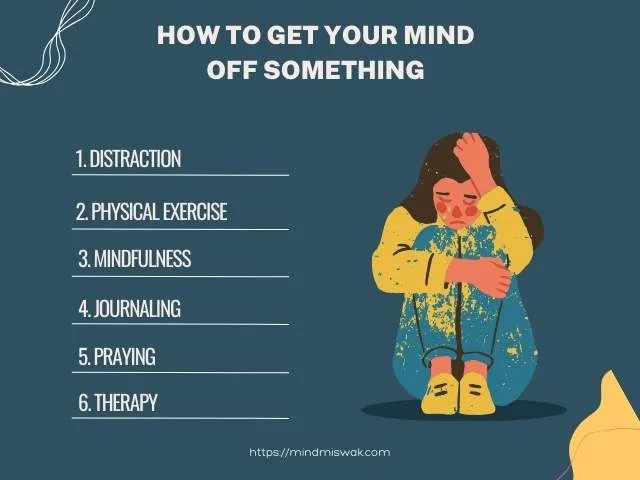Introduction
Contents
Have you ever been in a situation where you are forced to wonder how to get your mind off something? Well, you’re not alone, as it happens to the best of people. According to a study published in Nature Communications in 2020, humans tend to have about 6200 thoughts on average per day. Sometimes, one particular thought gets the full attention of our mind and gets us stuck in a thought loop, where the same thought repeats in our mind over and over again. In this article, we will discuss the issue of rumination and how it affects our mental state and share seven ways to get your mind off something.
Are you ruminating or worrying?
When you can’t get your mind off something, it’s because you’re either ruminating or worrying about something. But which one is it? And is there any difference between ruminating and worrying?
Rumination is the process of continuously thinking about the same issue, life event, or relationship. While ruminating, you are repeating thoughts about something from the past. Whereas worrying is concerned with thoughts about the future. There are more similarities than differences between ruminating and worrying as they develop following the same processes and adversely affect our well-being in the same manner.

Effects of repetitive negative thoughts
Due to ‘negativity bias,’ when we can’t take something off our minds, it’s most likely a negative thought. Neither ruminating nor worrying has a positive outcome because these repeated thoughts do not help us solve the problem through action. Lingering on negative thoughts for an extended period may have the following effects,
- Depression: Staying fixated on negative thoughts may increase the chance of experiencing a depressive episode. An article in the Journal of Affective Disorders identified high rumination as a predictor of severe depression.
- Loss of health: Replaying past conversations in your head, in some cases, makes you inactive and careless about your health and hygiene, which may lead to a medical issue. While ruminating, some people stop exercising or taking baths, some gain, and others lose weight due to binge eating or less calorie intake.
- Loss of focus and productivity: Ruminative thinking makes one lose track of important and urgent issues and decreases productivity.
- Inability to solve problems: When someone is unable to get rid of the negative thoughts replaying in his mind, it eventually impairs his cognitive function and problem-solving skills.
How to get your mind off something?

- Get Busy with a Distraction: One of the most straightforward and practical ways to get your mind off something is a distraction. Find any activity or entertainment that will enable you to control your thought channel with a remote. The distraction tool can be a book, movie, music, puzzle, sports, or video game. Watching an episode from The Office or immersing myself in the world of The Witcher 3 with a controller sometimes worked like a charm for me. For others, reading a book or doing something creative might do the trick.
- Exercise: Physical exercise is a great way to take your mind off something. When you move about, your body releases substances that make you feel good. Just a simple walk or run outside can channel your mind to replace negative thoughts with a positive one and change your mood entirely. If you are an indoor person, do some yoga, stretch, or dance to your favorite music. It will relax your mind and cheer you up.
- Meditation and Mindfulness: Clearing our mind from ruminating can be done through meditation and mindfulness. Meditating helps you identify the thought loop you’re stuck in and understand your emotions and feelings behind the thought. Mindfulness allows your mind to reset and focus on the present, which can help you to either stop or change the repetitive thought.
- Journaling: Another powerful tool that can help us escape the rumination loop is journaling. It allows us to externalize all our concerns, fears, and negative thoughts and gain insights into what triggers us to ruminate continuously. Through journaling, we engage in self-reflection, which often leads us to a new chain of thought.
- Praying: For a religious person, praying is the ultimate tool, as it involves believing in God, sharing our problems with Him, and relying on Him to solve all our problems, get rid of all our fears and concerns, and grant us happiness. Trusting in God makes one hopeful and optimistic to get through all difficulties, which is why religious people are less prone to fall into depression due to rumination.
- Self-esteem and high hope: Hope and self-esteem play an important role when dealing with rumination. According to this 2014 study, people with high hopes are less likely to get into depression even if they go through a high level of rumination. On the other hand, people who experience high rumination but have low hope easily fall into severe depression.
- Therapy: When it comes to treating rumination, medical science is still in its infancy. However, mental health practitioners usually suggest cognitive behavior therapy (CBT) and interpersonal psychotherapy (IPT). A new form of CBT has been developed in recent years to treat rumination. It’s called Rumination-Focused Cognitive Behavioral Therapy (RFCBT). It focuses on shifting the patient from unhelpful to helpful cognitive processing.
Wrapping Up
Each of these ways can help you get something off your mind. They can be particularly effective when combined or tailored to your personal preferences and situation. Remember, the key is to find what works best for you in shifting your focus from negative or obsessive thoughts to more positive and productive activities.









3 Comments